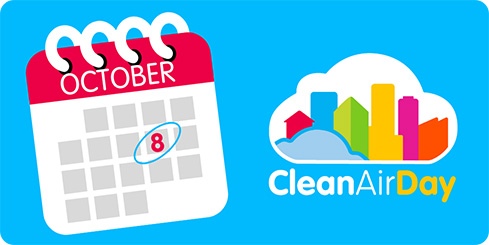UHB is backing Clean Air Day, the UK’s biggest air pollution campaign – by launching our new green strategy to become more sustainable, with a particular focus on air pollution – which has been linked to up to 40,000 deaths nationwide each year.
Air pollution is largest environmental health risk we face today according to the Government and the World Health Organisation, so we’re highlighting Clean Air Day by giving our workforce the opportunity to find out about our impact on the environment, see what we’ve already done about it, and see how we can all help to share ideas and work together to create cleaner, greener communities that provide healthier futures for us all.
Air pollution is proven to be damaging to our health, and studies have shown that air pollution can move microparticles from your lungs into your bloodstream reaching the brain and all major organs. It can particularly affect people who are more vulnerable, including those with heart and lung diseases, children and older adults.
Air pollution has also been linked to COVID-19 as those with health conditions that are caused or worsened by air pollution – such as asthma, heart disease and COPD – are more vulnerable to complications, if they contract COVID-19.
Emerging evidence also suggests that air pollution may be contributing to the number of COVID-19 cases by making those exposed to high levels of air pollution more susceptible to catching the disease.
Research has shown that air pollution in the UK is a major contributor in causing diseases such as asthma, lung disease, stroke, and heart disease, and it is estimated to cause up to 40,000 premature deaths each year, which is about 8.3% of all deaths and costs us all around £40 billion each year.
There are many sources of outdoor air pollution. The main causes in Britain are road transport, energy production, food production and heavy industry, and open fires.
Tim Jones, UHB’s Chief Innovation Officer, said: “During lockdown, our air became cleaner and it was one of the few silver linings of the COVID-19 lockdown. Through our collective actions we saw and experienced improvements in outdoor air quality. Let’s keep on with these behaviours to keep our air clean.
“As a Trust we have committed to a strategy that will see us become more sustainable by reducing single-use plastics, researching replacement polluting anaesthetic gases, investing in our green spaces and moving towards more green energy sources – among many other innovative solutions that support cleaner, greener communities.”
Here are a few ideas that we could try in Birmingham and Solihull to help us achieve a vision of a more sustainable and less polluted future:
- Give your car a day off by walking, cycling or taking public transport to work or school. Many employers have corporate transport schemes for cheaper public transport and cycle to work schemes, including UHB
- Use quieter streets when you’re on a bike or on foot to avoid polluted main roads – you’ll breathe in less polluted air
- Work from home more often if you can and challenge your workplace to make this easier for you
- Go electric by hiring an electric car, taxi or test drive an electric vehicle
- Don’t idle in your car if you do drive. Turn off your engine when your vehicle is stationary, particularly in places such as outside of our hospitals or outside of schools, and if it is safe to do so
- Avoid using wood burning stoves and open fires at home. If it is essential, burn dry, well-seasoned or ‘Ready-to-Burn’ labelled wood, or smokeless fuel that is sustainably sourced and don’t burning household and garden waste – take it to the tip instead
- Support local positive change – talk to your local Councillors and MP about air pollution in your area, and consider lending your support to Birmingham’s Clean Air Zone that aims to slash air pollution in our city
So what are we doing to tackle air pollution and other sustainability challenges?
At UHB, our environmental impact is huge:
- Our hospitals use over 215,000 mwh in gas and electricity a year. The same as powering over 13,400 homes a year
- We produce over 6,200 tonnes of waste a year, the same as filling over 50,100 household wheelie bins
- Our sites use around 690 million litres of water a year
- Our staff currently commute over 85 million kilometres by car each year – the equivalent of making over 1.5 million journeys from Longbridge to Tamworth
To reduce our impact, we have already:
- switched to a green energy electricity provider and harness our own solar power
- introduced extra waste streams to recycle more
- cut single use plastics from our wards and retail units
- negotiated discounted public transport for our workforce
- encouraged cycling to work with the cycle to work scheme, expanded storage and free bicycle maintenance and safety checks
Find out more about our vision for a sustainable future by reading our sustainability strategy, available under “Downloads”, or by joining the conversation online highlighting and championing our successes on social media – with some helpful advice for us all. Be sure to share your thoughts and innovative ideas to be part of the solutions we all need.
We’re on Twitter, Facebook and Instagram as @uhbtrust.
























